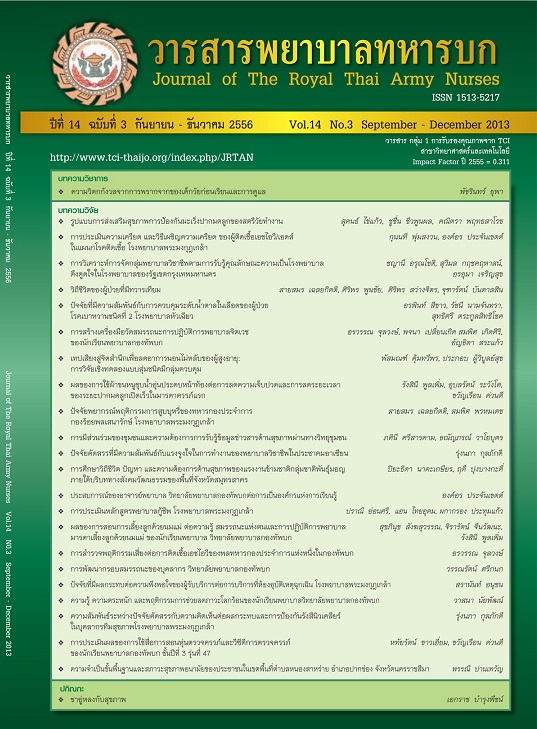การมีส่วนร่วมของชุมชนและความต้องการการรับรู้ข้อมูลข่าวสารด้านสุขภาพผ่านทางวิทยุชุมชน Community participation and Need of Health Information Perception through Community Radio
Keywords:
วิทยุชุมชน, การมีส่วนร่วมของชุมชน, ข้อมูลข่าวสารด้านสุขภาพ, community radio, community participation, health informationAbstract
วัตถุประสงค์ของการวิจัยครั้งนี้เพื่อศึกษาความต้องการ การมีส่วนร่วม และความต้องการ การรับรู้ข้อมูลข่าวสารด้านสุขภาพ ผ่านทางสถานีวิทยุชุมชน 103.75 เมกกะเฮิรตซ์ ในรายการ “รักษ์สุขภาพ” ของประชาชน 200 คนที่อาศัยอยู่ในตำบล ท่าตูม อำเภอเมือง จังหวัดมหาสารคาม โดยใช้แบบสอบถาม วิเคราะห์ข้อมูลโดยใช้ ความถี่ ร้อยละ ค่าเฉลี่ย
ผลการวิจัยพบว่า สาระสุขภาพตรงกับความต้องการ ร้อยละ 63.7 ได้รับประโยชน์ระดับมาก ร้อยละ 60.7 เคยมีคำถามหลังรับฟังรายการ ร้อยละ 41.5 เคยถามผ่านทางรายการ ร้อยละ 23.2 เคยนำความรู้ที่ได้รับมาใช้ประโยชน์ ร้อยละ 75.6 กลุ่มตัวอย่าง ต้องการมีส่วนร่วมในการเสนอความรู้ ร้อยละ 48.9 โดยผ่านทางโทรศัพท์และกล่องรับคำถามของสถานีวิทยุ ร้อยละ 54.8 และของโรงพยาบาลส่งเสริมสุขภาพตำบล ร้อยละ 45.2 ต้องการร่วมแลกเปลี่ยนประสบการณ์ในการดูแลตนเองและครอบครัวร้อยละ 40.7 ร่วมจัดรายการ ร้อยละ 25.9 และเป็นผู้จัดทำรายการ ร้อยละ 4.4 ต้องการให้มีการสัมภาษณ์ประสบการณ์การเจ็บป่วย ร้อยละ 34.8 สัมภาษณ์บุคคลที่มีการดูแลสุขภาพดี ร้อยละ 24.4 และ ถาม-ตอบ ปัญหาสุขภาพ ร้อยละ 31.1
รูปแบบการจัดรายการที่กลุ่มตัวอย่างคาดหวัง ได้แก่ การสนทนาระหว่างผู้จัดรายการและผู้ฟัง ร้อยละ 65.9 รูปแบบที่ชุมชนสามารถมีส่วนร่วมได้เป็นการจัดตั้งกลุ่มสุขภาพ ร้อยละ 53.3 และมีดีเจด้านสุขภาพ ร้อยละ 34.8
ข้อเสนอแนะคือ เพิ่มช่องทางการสื่อสาร 2 ทาง สนับสนุนการจัดตั้งกลุ่มสุขภาพ และผู้จัดรายการสุขภาพเพื่อเป็นแกนนำในการจัดกิจกรรมที่เกี่ยวข้องกับสุขภาพ
The purposes of this study were to determine participation and needs of health informationperception through community radio 103.75 MHz: Ruksukaphap. The sample composed of 200 community
members who lived in Tatoom Subdistrict, Muang District, Mahasarakham Province. The data were collected by questionnaire and were analyzed by using frequency, percentage, and mean.
The finding revealed that health education content met the needs of participants (63.7%), gaining benefits at high-level (60.7%). The participants need more health information (41.5%) and raised the questions (23.2%), knowledge utilization (75.6%). The community members wanted to participate in the radio program included determining the knowledge topics through community radio station’s telephone and questioning box (54.8), Primary care unit’s telephone and questioning box (45.2). The participants keen to share self-care and family care experiences (40.7%), participate in the broadcast activities (25.9%), and be broadcasters (4.4), interview about illness experiences (34.8), interview people who performed appropriated self-care (24.4) and
answer health questions during broadcast (31.1). The expected broadcast models that were purposed by the participants included conversation between audiences and forecasters (65.9) and model that community can participate named “Ruksusapha” (53.3%) and health D.J. (34.8). The findings of this study suggested that channel for two-way health information communication is needed include radio station website and health group initiation, and health D.J. should be supported to be
the leaders for facilitating health activities in community.
Downloads
Downloads
How to Cite
Issue
Section
License
บทความหรือข้อคิดเห็นใดใดที่ปรากฏในวารสารพยาบาลทหารบกเป็นวรรณกรรมของผู้เขียน ซึ่งบรรณาธิการหรือสมาคมพยาบาลทหารบก ไม่จำเป็นต้องเห็นด้วย
บทความที่ได้รับการตีพิมพ์เป็นลิขสิทธิ์ของวารสารพยาบาลทหารบก
The ideas and opinions expressed in the Journal of The Royal Thai Army Nurses are those of the authors and not necessarily those
of the editor or Royal Thai Army Nurses Association.






